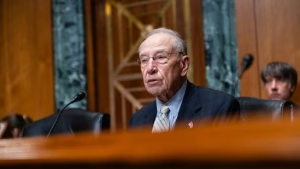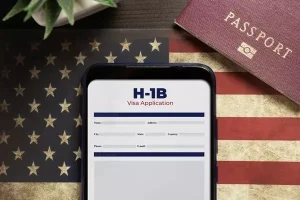Washington D.C. – Republican Senator Chuck Grassley has escalated immigration tensions by calling for comprehensive US work permits curbs targeting student visa holders, whom he claims “compete against Americans.” The proposed restrictions represent another significant blow to international students, particularly affecting the 331,000 Indian students currently studying in America.
The US work permits curbs proposal comes amid ongoing controversy over the Trump administration’s decision to increase H-1B visa application fees to $100,000. Grassley’s demands for eliminating work authorizations for foreign students would create additional barriers for international students seeking to gain practical experience in American industries.
Senator’s Security and Economic Arguments

In his social media statement advocating for US work permits curbs, Grassley argued that current work authorization policies violate federal law while exposing America to “tech and corporate espionage” risks. His letter to Department of Homeland Security Secretary Kristi Noem specifically requests termination of work authorizations for foreign student visa holders.
The senator’s push for US work permits curbs reflects broader Republican concerns about foreign nationals accessing American job markets. Grassley contends that allowing international students to work directly undermines employment opportunities for American citizens while potentially compromising national security through industrial espionage.
Impact on Optional Practical Training Programs
The proposed US work permits curbs would likely eliminate Optional Practical Training (OPT) authorizations, which currently allow students to work in America for 12 to 36 months immediately after completing their degrees. This pathway has been crucial for international students seeking to gain practical experience and transition to long-term work visas.
If implemented, these US work permits curbs would effectively close a primary route for international students to remain in America after graduation. The OPT program has traditionally served as a bridge between academic study and professional employment, making it essential for students planning careers in American industries.
Indian Students Face Multiple Challenges


The timing of these US work permits curbs particularly affects Indian students, who became the top source of international students in America for the first time since 2008-09. With over 331,000 Indian students currently enrolled in American institutions, any restrictions on work authorizations would significantly impact this population.
Recent data shows Indian graduate student numbers increased by 19% to reach almost 200,000 students, making them especially vulnerable to proposed US work permits curbs. The combination of increased H-1B fees and potential OPT elimination creates a hostile environment for Indian students pursuing American education and careers.
Declining Enrollment Trends and Future Projections
Even before formal implementation of US work permits curbs, international student arrivals have already declined significantly. July 2025 arrivals were substantially lower than 2024 numbers, with new student enrollment predicted to decline by approximately 50% in fall 2025.
Indian students are experiencing nearly 50% downward enrollment trends, suggesting that anticipated US work permits curbs are already influencing educational decisions. The combination of policy uncertainty and increased costs is prompting students to reconsider their “American Dream” aspirations.
H-1B Visa Context and Combined Impact
The proposed US work permits curbs come alongside the Trump administration’s $100,000 H-1B visa fee increase, creating compound challenges for international students and workers. While the H-1B fee applies only to new applications, the combined effect with OPT restrictions would severely limit pathways for international talent.
Also Read: Trump Zelensky Meeting: Dramatic NATO Shoot Down Russian Aircraft Declaration
According to government data, India accounted for 71% of H-1B visa beneficiaries in 2024, making US work permits curbs particularly significant for Indian professionals. The dual restrictions on both student work permits and H-1B visas represent a comprehensive approach to limiting foreign worker participation in American industries.
Trump Administration’s Immigration Philosophy
The Trump administration justifies US work permits curbs as part of ensuring foreign workers fill only highly-skilled positions that cannot be filled by American employees. Officials argue that current visa programs suppress wages and displace qualified American workers.
President Trump has specifically defended tightening rules on visa issuance, claiming that existing programs undermine American worker interests. The US work permits curbs align with broader immigration restriction policies aimed at prioritizing American employment over international talent recruitment.
Economic and Educational Implications
The proposed US work permits curbs could significantly impact American universities and industries that depend on international talent. Educational institutions have benefited from international student enrollment, while technology and research sectors rely heavily on foreign-educated workers.
Implementation of comprehensive US work permits curbs might reduce America’s competitive advantage in attracting global talent, potentially pushing skilled international students toward alternative destinations like Canada, the UK, and Australia, which currently host significant numbers of Indian students.
Global Competition for International Students
According to Indian government data, the US hosted 465,000 Indian students in 2023, representing the largest share of 1.3 million Indians studying abroad. However, US work permits curbs could accelerate the trend toward alternative destinations offering more favorable post-graduation work opportunities.
Countries like Canada and Australia have positioned themselves as more welcoming to international students through streamlined work permit processes, making them attractive alternatives as America implements restrictive US work permits curbs policies that limit post-graduation employment opportunities for international graduates.

